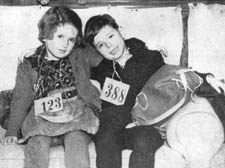|
|
 |
| |

Kindertransport children in 1938 |
To a place of greater safety
In the 1930s many brilliant Central European scholars found refuge from Nazi racism through what proved to be an extraordinary ‘brain drain’ to Britain, writes Illtyd Harrington
The Refuge and the Fortress:
Britain and the Flight From Tyranny.
By Jeremy Seabrook
Palgrave Macmillan £14.99
NO one in 1935, crossing the busy Southampton Street, took much notice of the young German Jew who seemed fascinated by the colour sequences of the traffic lights.
A few years later that man, Leo Szilard, before leaving to take part in the Manhattan Project and helping to make the atomic bomb, told a friend in London he had calculated that there would be a chain reaction to that terrible explosion. This was a more than accurate conclusion after watching the traffic lights.
Szilard’s scientific genius had been spotted by Einstein early on. He went on to build the world’s first nuclear reactor and the fast- breeder reactor.
To his credit, he realised the enormity of what he had helped to create, and he became a passionate nuclear disarmer.
His story is told by Jeremy Seabrook, here commemorating 75 years of what is now called the Council for Assisting Refugee Academics (Cara), the organisation set up in 1933, after Hitler came to power, by the father of the welfare state William Beveridge, then director of the London School of Economics, and Lord Rutherford, Britain’s leading authority on splitting the atom.
Both men quickly realised the value of the specialised academics who were being dismissed from German universities under the Nazis. Cara still aides and encourages academic refugees from oppressive regimes.
Seabrook writes with his usual blazing honesty and absorbing detail.
The lunacy and barbarity of Nazi racism led 400 or so of Germany’s most brilliant Jewish scholars to Britain – a brain drain which gave the US an early advantage on the road to becoming the world’s leading nuclear power. From 1900-1932, Jews made up only 1 per cent of Germany’s population. But in that period 25 per cent of German Nobel prize-winners were Jews.
Their enforced dispersal after 1933 enriched academic life. There was, for instance, Ernst Chain, who did as much as anyone else to discover penicillin; Ben Elton’s uncle, GR Elton, became professor of modern history at Cambridge University; and, unlikely as it was, Sir Nikolaus Pevsner became the authority on 600 English churches.
Then there was the dedicated Communist and brilliant scientist Klaus Fuchs, who worked diligently on the atomic bomb project and passed on the blueprints to Russian agents. His apologists claim his intention was to prevent a monopoly by the US, a view supported by Einstein in a letter to President Truman.
One refugee adopted Christianity and entered into Holy Orders. He applied for a vacancy for an Anglican church somewhere in Hampstead. In answer to question “Do you believe in God?” he replied “No”. Needless to say, he did not step into the vacant shoes of the vicarage.
After the war, CARA progressed its rescue and salvage work. Several Iraqi scholars scraped out a living as supply teachers in London schools.
Another distinguished intellectual from the Congo earned his bread at the Congolese School in Finsbury Park.
Britain is still held in high regard for our tolerance and compassion and often new exiles come after enduring the harshest of conditions. Tyrants – from Iran, Eritrea and China to Eastern Europe and Tajikistan – hate the influence of free thought. At a time when jobs are at stake, extremists find it easy to whip up prejudice, and Seabrook is a formidable ally against them.
Jon Snow, in a short, thoughtful forward, points out that the poverty endured by refugees and exiles after receiving help from CARA went on to be acknowledged by the state. Sixteen were knighted, 18 became Nobel laureates, 71 Fellows of the Royal Society, and 50 of the Royal Academy – a pretty good showing for those Hitler tormented into exile from the fatherland.
According to Seabrook, the last of that generation, now in great old age, can be seen in Golders Hill Park in suitable weather, enjoying each other’s company.
|
| |
|
 |
 |
|
 |
|


